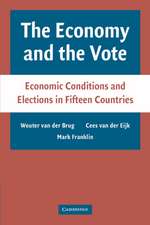Multi-Ethnic Coalitions in Africa: Business Financing of Opposition Election Campaigns: Cambridge Studies in Comparative Politics
Autor Leonardo R. Arriolaen Limba Engleză Paperback – 14 oct 2012
| Toate formatele și edițiile | Preț | Express |
|---|---|---|
| Paperback (1) | 225.75 lei 3-5 săpt. | |
| Cambridge University Press – 14 oct 2012 | 225.75 lei 3-5 săpt. | |
| Hardback (1) | 676.85 lei 6-8 săpt. | |
| Cambridge University Press – 14 oct 2012 | 676.85 lei 6-8 săpt. |
Din seria Cambridge Studies in Comparative Politics
-
 Preț: 231.28 lei
Preț: 231.28 lei -
 Preț: 261.81 lei
Preț: 261.81 lei -
 Preț: 259.91 lei
Preț: 259.91 lei -
 Preț: 201.80 lei
Preț: 201.80 lei -
 Preț: 200.75 lei
Preț: 200.75 lei -
 Preț: 250.38 lei
Preț: 250.38 lei -
 Preț: 195.46 lei
Preț: 195.46 lei -
 Preț: 238.39 lei
Preț: 238.39 lei -
 Preț: 156.18 lei
Preț: 156.18 lei -
 Preț: 160.19 lei
Preț: 160.19 lei -
 Preț: 229.62 lei
Preț: 229.62 lei -
 Preț: 226.41 lei
Preț: 226.41 lei -
 Preț: 268.51 lei
Preț: 268.51 lei -
 Preț: 177.28 lei
Preț: 177.28 lei -
 Preț: 231.81 lei
Preț: 231.81 lei - 8%
 Preț: 497.19 lei
Preț: 497.19 lei - 9%
 Preț: 594.66 lei
Preț: 594.66 lei -
 Preț: 197.56 lei
Preț: 197.56 lei -
 Preț: 219.20 lei
Preț: 219.20 lei -
 Preț: 185.61 lei
Preț: 185.61 lei -
 Preț: 200.56 lei
Preț: 200.56 lei -
 Preț: 358.35 lei
Preț: 358.35 lei -
 Preț: 358.35 lei
Preț: 358.35 lei -
 Preț: 257.10 lei
Preț: 257.10 lei -
 Preț: 180.29 lei
Preț: 180.29 lei -
 Preț: 237.63 lei
Preț: 237.63 lei - 9%
 Preț: 626.55 lei
Preț: 626.55 lei -
 Preț: 154.19 lei
Preț: 154.19 lei -
 Preț: 193.33 lei
Preț: 193.33 lei - 11%
 Preț: 675.17 lei
Preț: 675.17 lei - 11%
 Preț: 537.98 lei
Preț: 537.98 lei -
 Preț: 280.63 lei
Preț: 280.63 lei -
 Preț: 254.52 lei
Preț: 254.52 lei - 11%
 Preț: 671.86 lei
Preț: 671.86 lei -
 Preț: 377.24 lei
Preț: 377.24 lei -
 Preț: 279.90 lei
Preț: 279.90 lei -
 Preț: 221.41 lei
Preț: 221.41 lei -
 Preț: 374.30 lei
Preț: 374.30 lei -
 Preț: 304.03 lei
Preț: 304.03 lei - 11%
 Preț: 641.82 lei
Preț: 641.82 lei -
 Preț: 278.94 lei
Preț: 278.94 lei -
 Preț: 244.02 lei
Preț: 244.02 lei -
 Preț: 304.82 lei
Preț: 304.82 lei -
 Preț: 269.39 lei
Preț: 269.39 lei
Preț: 225.75 lei
Nou
Puncte Express: 339
Preț estimativ în valută:
43.21€ • 45.58$ • 36.01£
43.21€ • 45.58$ • 36.01£
Carte disponibilă
Livrare economică 13-27 decembrie
Preluare comenzi: 021 569.72.76
Specificații
ISBN-13: 9781107605435
ISBN-10: 1107605431
Pagini: 324
Ilustrații: 31 b/w illus. 1 map 15 tables
Dimensiuni: 155 x 233 x 16 mm
Greutate: 0.45 kg
Ediția:New.
Editura: Cambridge University Press
Colecția Cambridge University Press
Seria Cambridge Studies in Comparative Politics
Locul publicării:New York, United States
ISBN-10: 1107605431
Pagini: 324
Ilustrații: 31 b/w illus. 1 map 15 tables
Dimensiuni: 155 x 233 x 16 mm
Greutate: 0.45 kg
Ediția:New.
Editura: Cambridge University Press
Colecția Cambridge University Press
Seria Cambridge Studies in Comparative Politics
Locul publicării:New York, United States
Cuprins
1. The puzzle of opposition coordination; 2. A theory of pecuniary coalition formation; 3. The emergence of financial reprisal regimes; 4. The political control of banking; 5. The liberalization of capital; 6. The political alignment of business; 7. Opposition bargaining across ethnic cleavages; 8. Multi-ethnic opposition coalitions in African elections; 9. Democratic consolidation in Africa.
Recenzii
"A major contribution. Arriola draws not only from Africanist literatures, but also from scholarship on other regions. His account will be broadly read and influential. Learned, rigorous, and deeply thoughtful. Full marks!"
Robert H. Bates, Harvard University
"Under conditions in which the benefits of political office are presumed to accrue only to those who share the ethnicity of the officeholder, how can a multiethnic opposition coalesce to unseat an incumbent? Leonardo Arriola provides an original and compelling answer rooted not in politics, but business: financial deregulation and banking reform liberates private capital holders from government control, which frees them to contribute to the regime’s opponents. Opposition leaders then use this money to buy, upfront, the endorsements of leaders from multiple ethnic groups. By demonstrating the connections between financial and political liberalization, and by solving the long-standing puzzle of explaining the existence of multiethnic coalitions, Arriola makes a valuable contribution to the study of African political economy."
Daniel N. Posner, Massachusetts Institute of Technology
"Arriola's book argues with impressive verve and great learning that African incumbents owe their political longevity to their ability to control domestic capital. In the process, he takes the reader through a comprehensive and compelling tour of post-colonial African political economy, shedding new light on a number of issues in novel ways, from the salience of ethnicity, to the relationship between independence parties and the private sector, and the success of opposition coalitions in the past decade. I believe this book represents an impressive achievement and will be considered one of the landmark works in African political economy."
Nicholas van de Walle, Cornell University
Robert H. Bates, Harvard University
"Under conditions in which the benefits of political office are presumed to accrue only to those who share the ethnicity of the officeholder, how can a multiethnic opposition coalesce to unseat an incumbent? Leonardo Arriola provides an original and compelling answer rooted not in politics, but business: financial deregulation and banking reform liberates private capital holders from government control, which frees them to contribute to the regime’s opponents. Opposition leaders then use this money to buy, upfront, the endorsements of leaders from multiple ethnic groups. By demonstrating the connections between financial and political liberalization, and by solving the long-standing puzzle of explaining the existence of multiethnic coalitions, Arriola makes a valuable contribution to the study of African political economy."
Daniel N. Posner, Massachusetts Institute of Technology
"Arriola's book argues with impressive verve and great learning that African incumbents owe their political longevity to their ability to control domestic capital. In the process, he takes the reader through a comprehensive and compelling tour of post-colonial African political economy, shedding new light on a number of issues in novel ways, from the salience of ethnicity, to the relationship between independence parties and the private sector, and the success of opposition coalitions in the past decade. I believe this book represents an impressive achievement and will be considered one of the landmark works in African political economy."
Nicholas van de Walle, Cornell University
Notă biografică
Descriere
Africa's long-ruling incumbents stay in power because opposition politicians struggle to secure the finances required to build electoral coalitions.














